How wheelchair tennis player Dylan Alcott became a game changer
NEXT week he’ll vie for a third Australian Open title, he has Paralympic gold in two sports and the Newcombe Medal, but Dylan Alcott’s impact is being felt far and wide.
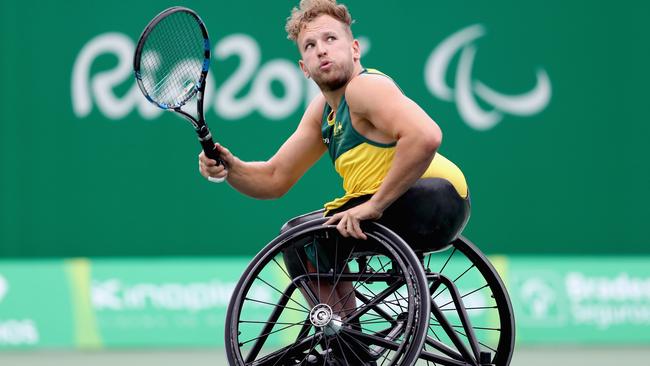
VIC News
Don't miss out on the headlines from VIC News. Followed categories will be added to My News.
YOU would imagine a sports-star entourage for a guy with three international gold medals to his name. At the very least, you would expect an officious agent or a protective publicist to be hovering around their high-profile client. But there’s none of that.
That’s one of the things that makes Dylan Alcott, 25, different. His wheelchair is another.
Alcott’s apartment in Balaclava, where he lives with his long-term girlfriend Kate Lawrence, 31, is lacking in obvious signifiers of his disability. It’s on the second floor, for starters. A lift breakdown, a mere stair-climbing nuisance for other residents, renders Alcott housebound. There are also no ramps, handrails or pulley systems in the home.
The only adjustment the couple made was to narrow the glass door on the shower so a chair could fit in it.
“And now the water goes everywhere, it’s a pain in the a---,” Alcott groans.
It’s telling of his character that the water on the floor of the bathroom is the inconvenience, not the chair.
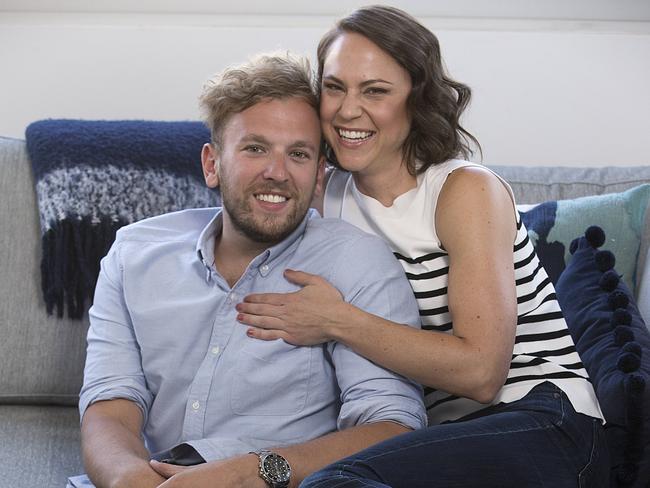
So why is Dylan Alcott in a wheelchair?
“Well, Kate was driving …,” he says, laughing while Kate rolls her eyes and gives a wry smile.
He is joking, of course. His sense of humour is at times disarmingly self-deprecating, but it
is always infectiously positive. Alcott then recounts what really led to him being in a wheelchair. Like someone reciting a familiar script, it’s a monologue he knows off by heart.
“If you take a small melon, chop it in half and stick half of it on your back, that’s how
I was born. It was wrapped around my spinal cord and they got rid of as much as they could so I didn’t die, but they had to damage my spinal cord.
“I spent pretty much three years in and out of hospital, had approximately 15 operations and at about 3½, I got a bit fitter.
“I’ve been pretty lucky, I’ve hardly been back since.
“I can’t imagine what it was like for my parents. I also have an older brother Zach, who is 2½ years older. It would have been horrible.”
Alcott credits his resilience and defiance in disabled sport, not just to those first few years but also to his upbringing and his family, from whom he never received special treatment.
“Zach and I used to fight over the Foxtel remote. Zach could run quicker than I can, obviously, so he would get the control. I would try to steal it when he went to the bathroom so he started putting it on top of the fridge where I couldn’t reach it.
“It was a bit of a jerk move at the time, but I think a lot of people with disabilities, kids especially, are wrapped in cotton wool by their families and friends because they are different.
“But when they go out into the real world and less people care about them, they’re lost and have no independence.”
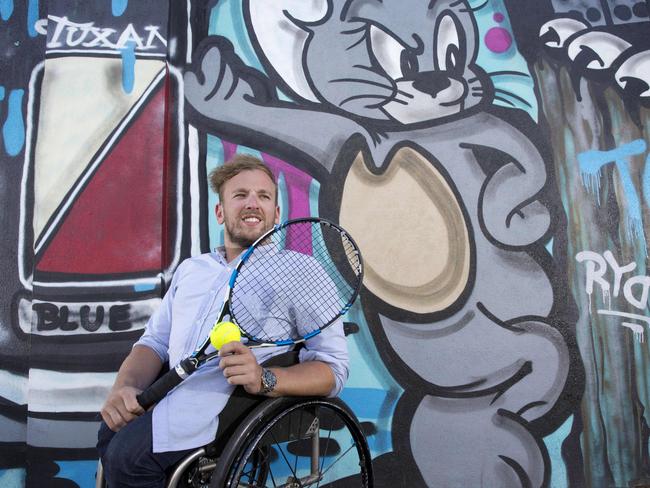
ALCOTT started taking an interest in sport around the age of 10, first in tennis, then swimming, which by his own admission, he was terrible at. It wasn’t a fairy tale ascension to sporting glory … at first.
“I was overweight in high school because I was a bit embarrassed about my disability.
I didn’t want to go out because I was uncomfortable with it, so I just sat at home
and played video games and ate food.
“A couple of guys started calling me ‘cripple’, which I hated, but I started believing it, I guess. For a few years it was pretty rough.
“But the thing was, even when I was overweight I was good at sport, so when I figured out that I could actually be really good if I tried, I thought, ‘S---, I’ve got to lose weight.’ ”
Alcott put himself through a punishing training schedule: he put extra books in the back of his chair and pushed himself the 2.5km to and from school in Brighton and “ate nothing but rice crackers for six months”.
“In about nine months I lost, well, I don’t know how much, because I can’t weigh myself or get on scales, but I guess it was about 20kg.”
Then, at 15, Alcott took up wheelchair basketball. At 17, while still completing high school, Alcott became the youngest wheelchair basketball gold medallist, at the 2008 Beijing Paralympics. He represented Australia again in wheelchair basketball at the 2012 Paralympics in London. Then in 2013, he switched back to his first love, wheelchair tennis, winning his first grand slam title at the 2015 Australian Open and taking home the trophy again last year before winning the gold medal for both the doubles and singles at the Rio Paralympics in September. His eye is on the Oz Open prize again next week.
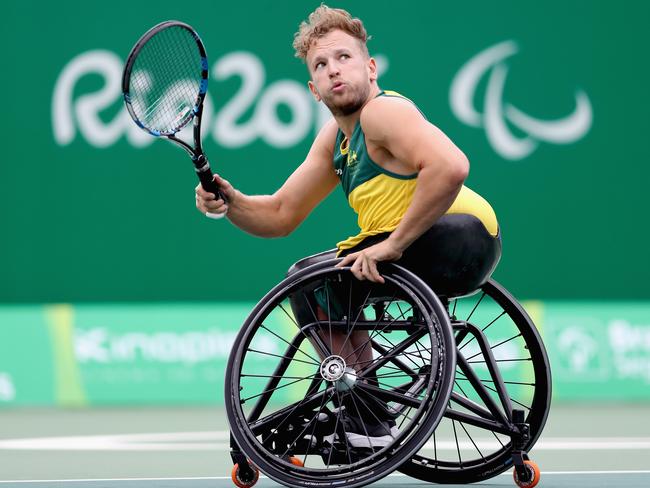
“People often announce me as, ‘tennis player Dylan Alcott’, and I correct them and say, ‘I play wheelchair tennis’,” he says.
“I want to be honest, and it’s a positive thing. Like Paralympians that say they went to the Olympics. That’s wrong. You went to the Paralympics, and you should be proud of that.”
The closing ceremony at last year’s Rio Paralympic Games capped off a carnival of wins, with more than 100 records smashed.
“For two weeks, we ruled the world. The Olympics are the crappy warm-up event,” Alcott jokes.
But for the gold medallist, living at the Paralympic Village, where a human kaleidoscope from 159 nations plus a team of two refugees converged, was more inspiring than any of the stirring sporting moments.
“It’s the most amazing thing ever at the village. I remember the first time at the Beijing Games, I walked in and saw this guy from China eating fried rice with chopsticks that he was holding between his toes. That guy also swims 100m backstroke in just over one minute. He’s only six seconds slower than blokes with arms. It’s the best thing you’ll ever see: that mix of people that are all elite athletes.
“People send me stuff all the time about stem cell research and robotic legs and I’m not interested. Even if it did work, I love my life how it is. I wouldn’t have the opportunities I’ve had without being in a wheelchair. Why would I want to change that to be a run-of-the-mill person? Seriously, apart from getting up the stairs by yourself, and walking on the beach, there’s a way to do everything else.”
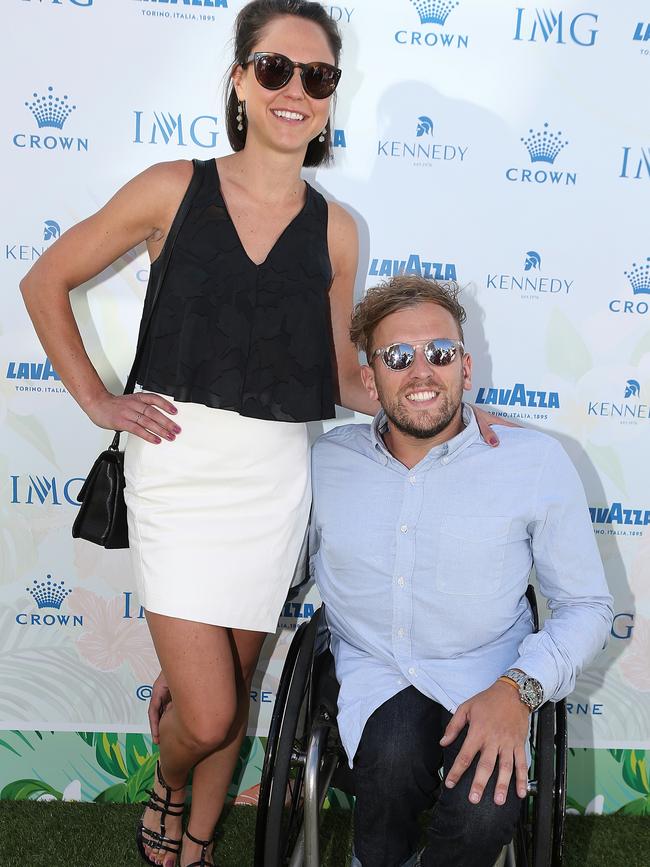
ALCOTT hopes to highlight the obstacles overcome by disabled people every day by remaining in the limelight for a little longer than two weeks every four years. He has just begun his first “real” job as a DJ for Triple J and is also determined to forge a career in television.
“What 25-year-old with no experience gets his own radio show? It’s amazing.
“I really want to work in the media not only because I think I would enjoy it and be good at it, but also there are not enough people with disabilities in mainstream media. Like zero. I mean (comedian) Adam Hills has one foot but no one knows that. It would be really powerful to break down barriers and change perceptions — not to talk about it, but just for kids to turn on the TV and see me.
“If I could have turned on the TV and seen a guy in a wheelchair when I was 12 and having a tough time at school, I would have been like, ‘Who is that guy?’ and then tried to emulate him.
“I would love to get a regular gig on a show like The Project or The Today Show. I would also love to be on Postcards or Getaway because there are a lot of people in wheelchairs that love to travel. Twenty per cent of the population are disabled and they don’t know what they can do.
“Some people rant about discrimination and jobs — I have the other approach: I show up and be normal and do normal things. I go to music festivals and crowd surf, I go to The Birdcage at the races where there are stairs everywhere and I drive a car using hand controls.”
Wow, what’s that like?
“I don’t know. What’s it like driving a car with your feet?” he jokes.
“But seriously, it’s nice to get messages from mums and dads saying, ‘Thank you so much for showing my kid what’s possible.’
“I looked up to Pat Rafter as a kid, but I could never be Pat Rafter. I knew some other kids my age in a wheelchair but that was it. Now people can look up to Paralympians and people in the media and people with good jobs, and with 10-out-of-10 girlfriends.”
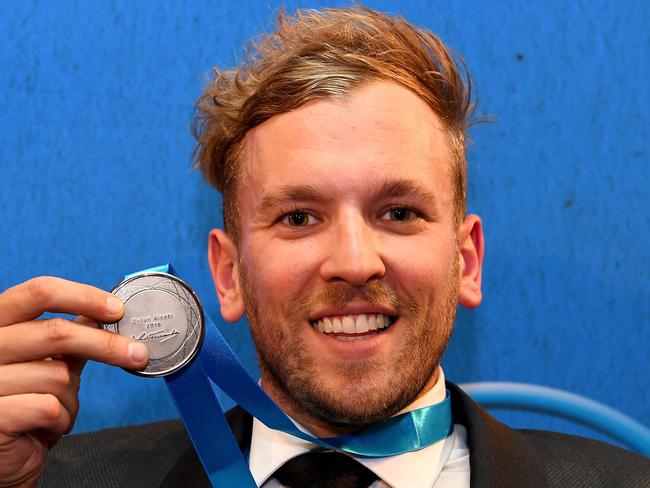
ALCOTT started dating Lawrence, who works at Telstra, three years ago.
“We met six years ago through mutual friends,” Lawrence says.
“When we first met, we got on really well, and we were friends instantly. But then when we started actually dating, I definitely saw the wheelchair, it was definitely about moving very slowly. It was different, obviously.”
“I completely understood it,” Alcott says.
“It’s all good and well to be friends with someone in a wheelchair, but when it comes to being intimate with someone in a wheelchair, it’s a huge thing.”
“Yes, very different,” Lawrence says, “but now it’s normal.”
“Normal?” Alcott scoffs. “Benefit is what I would say. Great carparks. Birdcage passes. Paralympics.”
“I think I do a lot around the house,” Lawrence says.
“Yeah, I do use my wheelchair card a bit too much,” Alcott adds.
Lawrence says there have been confronting and challenging moments, and Alcott is quick to praise her.
“It must be weird and hard, and I’m lucky to have her and also lucky that I don’t give a s---. A lot of people don’t even bother with relationships because they don’t want to be too vulnerable. I’m glad I’ve got the schtick to do it and pull a 10-out-of-10 like her,” he says.
“A lot of people can’t believe it when they see her, because she’s amazing and beautiful. Most people assume my girlfriend is in a wheelchair. Some people look at us and think she is my sister or my nurse, which is stupid. Or we will be holding hands going down the street and people would look at us. I’m so lucky.
“She’s lucky, too. I’ve got soft hands. Most guys in wheelchairs have hands like sand paper. I feel sorry for their girlfriends.”
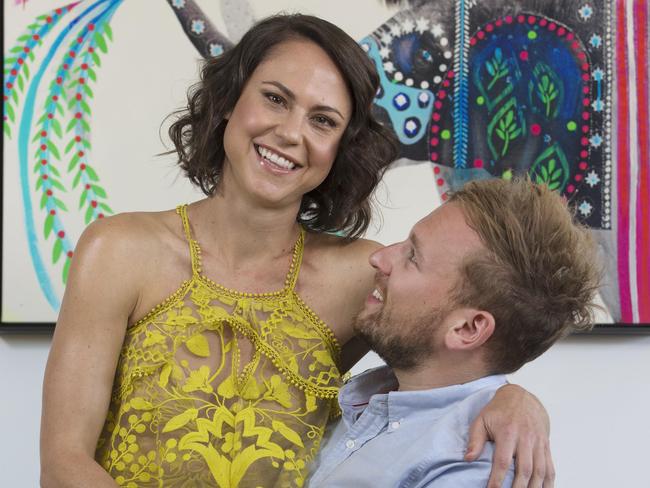
OF all his significant achievements in the past year, including being named GQ Sportsman of the Year, and being nominated for the Donald Bradman award, it was winning the Newcombe Medal that best signified the progress Alcott had striven for through sport, in terms of championing recognition, challenging stigmas and changing the tenor of conversation around disability.
“It was a huge opportunity because none of the major sports, like swimming or basketball, have ever given the main award to a disabled person.
“There’s always an athlete with a disability category and that’s a huge honour to win, but
I see myself as an elite athlete who happens to have a disability and uses a wheelchair as a way to play.
“Winning the Newcombe Medal was, hopefully, a real turning point for disabled sports. People wrote articles in the US and the UK about it, and a lady today walked past me and said, ‘I’ve not known much about Australian disabled sport, but I do now. Good on you.’ ”
Maybe that’s what Alcott really deserves a medal for.


